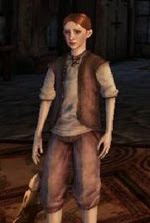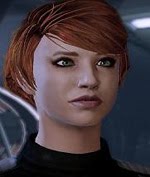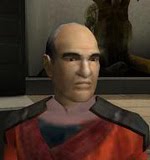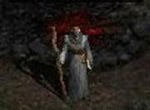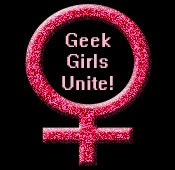This restates some of the points that I made in my initial response to Ginia Bellafante's New York Times "Game of Thrones" review on Friday, but it is directed at Ms. Bellafante and emphasizes criticisms that she failed to address in her recent response.
I admit that we--the George R. R. Martin fans, the female lovers of fantasy, the geek community, etc.--were so offended by your review of "Game of Thrones" that in many cases we allowed our fury to cloud our judgment in writing respectable responses. I myself got worked up about your estimation that the cost of "Game of Thrones" could take "Mad Men" to the second term of a Malia Obama presidency, when my own calculation put the "Game of Thrones" cost at only about three seasons of "Mad Men." Your hyperbole was clearly not intended to be a factual statement, however, so I should have just let it go. Furthermore, it must have seemed odd to you that so many people who hadn't even watched the show yet could disagree so vehemently with your review. We didn't even now what we were talking about, right? Still, I believe some of our complaints about the review were legitimate, and they were the ones largely ignored in your recent response.
Your review implied that the sex in the show was the only likely draw for a female audience, because "Game of Thrones" is "boy fiction." First of all, the assumption that women watch shows for the sex seemed odd to me. Now maybe this is because I don't know any women who watch "Sex in the City," but I always thought that sex was added to TV and movies to attract men. Statistics might prove me wrong, but the generalization still seemed to come out of nowhere. More importantly, by calling the show "boy fiction," you either dismissed as insignificant all female fans of A Game of Thrones (though you recognized that we must exist), or you implied that our tastes are contrary to our sex. True, none but a privileged few of us had actually seen the pilot before Sunday, but when a TV series is based on books, it is not unreasonable to assume that the content will be similar, and thus that the show will attract a similar audience. The problem was that you offered no reasons to support your claim that the show was "boy fiction." Were the female characters one dimensional, weak, or boring? Are all the smart, reasonable, heroic characters men? Was most of the drama between males to whom you couldn't relate? Any reason explaining your accusation could have helped us to understand why you thought the show was unsuitable to feminine sensibilities and might have caused us to reserve judgment until we had seen the show ourselves. Instead you offered no such explanation, leaving us to believe that what little you did talk about--the show's complexity, created language, and medieval fantasy setting--somehow made the show unsuitable for females. This is what female fantasy fans, who love complexity, created languages, and medieval fantasy settings, found offensive.
I'm a nobody, you're a New York Times TV critic, so I can't tell you how to write a review. Still, in this case a discussion of the actual content of the show, including plot and characters, could have helped to prevent some of the controversy surrounding your review. Yes, there are a lot of characters and the plot is complicated, but that is no excuse to talk only about the production, the weather, and the sex. As a reviewer, you are entitled to your opinion. But since you can only speak for yourself, as you recognize, it would be useful if your reviews included enough information to guide readers toward their own evaluations. Your recent review of CBS's "Chaos," for example, described the plot, characters, humor, and action well enough to help a reader decide whether or not to give the show a chance. It's a shame you didn't give "Game of Thrones" such reasonable treatment.
Tuesday, April 19, 2011
Monday, April 18, 2011
More thoughts on Dragon Age 2...
Friday, April 15, 2011
Response to the NY Times review of "Game of Thrones"
And I thought we were doing so well.
On Thursday morning, I saw Susan C. Young's article "Geek girls help power viewership for sci-fi/fantasy TV" at MSNBC. The article highlighted HBO's new "Game of Thrones" series, based on the A Song of Ice and Fire books by George R. R. Martin. As a passionate female fan of fantasy and sci-fi TV, it's always nice to see some recognition that women can love these geeky genres as well as men. But then on Thursday evening, I saw Ginia Bellafante's New York Time's review of "Game of Thrones". Her message was quite the opposite, perpetuating the falsehood that women don't like fantasy.
Ms. Bellafante didn't so much review the show as she did take the opportunity to show her disdain for the fantasy genre and assert that it is not suitable for feminine sensibilities. I got the impression that she thinks HBO is crazy to have spent so much money on a loony land of make-believe.
Ms. Bellafante goes on to complain about the plot complexity and spends a whole paragraph expressing her confusion over the fact that a fantasy world might not have a climate exactly like the present Earth. Plot complexity may be a legitimate concern, but it is not necessarily a bad thing. It may turn off the casual viewer, but it rewards the loyal viewer. Thinking is good. "Lost," for instance, thrived on its complex plot and large cast of characters. And while complex TV shows can sometimes get tangled in trying to tie together their story lines, with "Game of Thrones" we already know that George R. R. Martin has done a masterful job at crafting the plot. Second, fantasy worlds can have whatever climate they darn well please. It's fantasy. This discussion does not belong in a review.
Still, the most ridiculous part of the review (other than the fact that it offers very little information about the show's content) is when Ms. Bellafante points to the sex in the show as the only possible draw for a female audience, because "Game of Thrones" is, simply put, "boy fiction." (What does that even mean? Sure, it is fiction written by a "boy"...does that make Harry Potter "girl fiction"?)
More importantly, though, "Game of Thrones" doesn't need sex scenes to attract female viewers. Ms. Bellafante guesses, correctly, that there do exist women who read books like Mr. Martin's, but a quick Google search could have provided proof that there are lots of women who read books exactly like Mr. Martin's. A Song of Ice and Fire has an impressive female fan base. Women didn't show up at HBO's "Game of Thrones" food trucks just because they heard there would be lemon cakes. It's one thing to review a new, original TV show and guess at the audience it will attract, but when a show is based on an established franchise, one can do research and find out what audience already exists.
So why might women like "Game of Thrones"? I can't speak for every woman, but I love fantasy worlds. I love swords and warhorses and lavish gowns and crowns and magic and mythical monsters. I love fantasy especially when it features strong female characters to whom I can relate. Game of Thrones is woven around an impressive cast of interesting, unique, complicated characters, many of whom are women. Game of Thrones has plenty of female characters for a girl like me to love, admire, and respect.
Seeing as the only book club I have ever belonged to was a fantasy book club in high school, I assure you that I, along with all the other young women in the club (we made up over 50% of the members my junior and senior years), would indeed have stood up in indignation and refused to read the latest from Lorrie Moore. No offense meant to Lorrie Moore (I had to Wikipedia her but she seems like a nice lady). I am sure there are women in this world who read books like Ms. Moore's, but in my book club, we preferred The Hobbit. Now, I realize Ms. Bellafante has probably never met any of us from that club (she clearly doesn't associate with any geek girls), but I don't imagine that a random public high school in a Boston suburb is the only haven for women who like fantasy literature. Geek girls not only do exist, but we are everywhere.
In short, there are tons of women who will love watching "Game of Thrones" for many reasons beyond the sex scenes. If you like rich worlds with complex characters--both male and female--and smart, challenging plot lines, then give "Game of Thrones" a try. If you don't like the fantasy genre as a whole and are only mildly interested in the series because of the sex, then you'd be better off with reruns of "Sex and the City."
* Edit: Altered from my original interpretation of the sentence to a more charitable and likely one.
And my conservative back of the envelope calculation, in case you're curious:
Mad Men budget = $2.3 million per episode (NYT magazine) x 13 episodes per season =
$29.9 million per season
Cost of Game of Thrones = no more than $100 million (Entertainment Weekly, April 8, 2011, pg. 38). To be conservative, take $100 million.
GoT cost/ MM seasonal cost = 3.34
2011+3.34 = 2014.34, round up to the nearest primary to be charitable = 2016.
The point is that even if HBO is drastically under-reporting its figures, and say actually spent $150 million, that would give Mad Men 5 more years and still put Malia up for a 2016 primary.
On Thursday morning, I saw Susan C. Young's article "Geek girls help power viewership for sci-fi/fantasy TV" at MSNBC. The article highlighted HBO's new "Game of Thrones" series, based on the A Song of Ice and Fire books by George R. R. Martin. As a passionate female fan of fantasy and sci-fi TV, it's always nice to see some recognition that women can love these geeky genres as well as men. But then on Thursday evening, I saw Ginia Bellafante's New York Time's review of "Game of Thrones". Her message was quite the opposite, perpetuating the falsehood that women don't like fantasy.
Ms. Bellafante didn't so much review the show as she did take the opportunity to show her disdain for the fantasy genre and assert that it is not suitable for feminine sensibilities. I got the impression that she thinks HBO is crazy to have spent so much money on a loony land of make-believe.
With the amount of money apparently spent on “Game of Thrones,” the fantasy epic set in a quasi-medieval somewhereland beginning Sunday on HBO, a show like “Mad Men” might have the financing to continue into the second term of a Malia Obama presidency.A five-minute Google search and back-of-the-envelope calculation proves this to be a ridiculously misleading estimation: Malia, you'd better be ready for the 2016 primary.* This must be a case of "not intended to be a factual statement."
Ms. Bellafante goes on to complain about the plot complexity and spends a whole paragraph expressing her confusion over the fact that a fantasy world might not have a climate exactly like the present Earth. Plot complexity may be a legitimate concern, but it is not necessarily a bad thing. It may turn off the casual viewer, but it rewards the loyal viewer. Thinking is good. "Lost," for instance, thrived on its complex plot and large cast of characters. And while complex TV shows can sometimes get tangled in trying to tie together their story lines, with "Game of Thrones" we already know that George R. R. Martin has done a masterful job at crafting the plot. Second, fantasy worlds can have whatever climate they darn well please. It's fantasy. This discussion does not belong in a review.
Still, the most ridiculous part of the review (other than the fact that it offers very little information about the show's content) is when Ms. Bellafante points to the sex in the show as the only possible draw for a female audience, because "Game of Thrones" is, simply put, "boy fiction." (What does that even mean? Sure, it is fiction written by a "boy"...does that make Harry Potter "girl fiction"?)
The true perversion, though, is the sense you get that all of this illicitness has been tossed in as a little something for the ladies, out of a justifiable fear, perhaps, that no woman alive would watch otherwise. While I do not doubt that there are women in the world who read books like Mr. Martin’s, I can honestly say that I have never met a single woman who has stood up in indignation at her book club and refused to read the latest from Lorrie Moore unless everyone agreed to “The Hobbit” first. “Game of Thrones” is boy fiction patronizingly turned out to reach the population’s other half.I plan to watch "Game of Thrones" in spite of the sex. Call me a prude, but I'm a little uncomfortable whenever a sex scene comes up on "True Blood." One of my straight male friends, on the other hand, told me he started watching "True Blood" for the sex, but got hooked on it because of the story. If that is one way that "Game of Thrones" will gain viewers, that's fine--I want the show to be a success. But I don't think the sex scenes in the show are the producers' desperate attempt to attract a female audience. One could just as justifiably assert that the sex scenes are an example of the producers pandering to the teenage male demographic.
More importantly, though, "Game of Thrones" doesn't need sex scenes to attract female viewers. Ms. Bellafante guesses, correctly, that there do exist women who read books like Mr. Martin's, but a quick Google search could have provided proof that there are lots of women who read books exactly like Mr. Martin's. A Song of Ice and Fire has an impressive female fan base. Women didn't show up at HBO's "Game of Thrones" food trucks just because they heard there would be lemon cakes. It's one thing to review a new, original TV show and guess at the audience it will attract, but when a show is based on an established franchise, one can do research and find out what audience already exists.
So why might women like "Game of Thrones"? I can't speak for every woman, but I love fantasy worlds. I love swords and warhorses and lavish gowns and crowns and magic and mythical monsters. I love fantasy especially when it features strong female characters to whom I can relate. Game of Thrones is woven around an impressive cast of interesting, unique, complicated characters, many of whom are women. Game of Thrones has plenty of female characters for a girl like me to love, admire, and respect.
Seeing as the only book club I have ever belonged to was a fantasy book club in high school, I assure you that I, along with all the other young women in the club (we made up over 50% of the members my junior and senior years), would indeed have stood up in indignation and refused to read the latest from Lorrie Moore. No offense meant to Lorrie Moore (I had to Wikipedia her but she seems like a nice lady). I am sure there are women in this world who read books like Ms. Moore's, but in my book club, we preferred The Hobbit. Now, I realize Ms. Bellafante has probably never met any of us from that club (she clearly doesn't associate with any geek girls), but I don't imagine that a random public high school in a Boston suburb is the only haven for women who like fantasy literature. Geek girls not only do exist, but we are everywhere.
In short, there are tons of women who will love watching "Game of Thrones" for many reasons beyond the sex scenes. If you like rich worlds with complex characters--both male and female--and smart, challenging plot lines, then give "Game of Thrones" a try. If you don't like the fantasy genre as a whole and are only mildly interested in the series because of the sex, then you'd be better off with reruns of "Sex and the City."
* Edit: Altered from my original interpretation of the sentence to a more charitable and likely one.
And my conservative back of the envelope calculation, in case you're curious:
Mad Men budget = $2.3 million per episode (NYT magazine) x 13 episodes per season =
$29.9 million per season
Cost of Game of Thrones = no more than $100 million (Entertainment Weekly, April 8, 2011, pg. 38). To be conservative, take $100 million.
GoT cost/ MM seasonal cost = 3.34
2011+3.34 = 2014.34, round up to the nearest primary to be charitable = 2016.
The point is that even if HBO is drastically under-reporting its figures, and say actually spent $150 million, that would give Mad Men 5 more years and still put Malia up for a 2016 primary.
Reflecting on Dragon Age 2
I haven't posted in two weeks now, partly because school has been keeping me very busy since spring break, as we're nearing the end of the semester, and partly because I've been spending most of my free time finishing up Dragon Age 2. In short, I loved it. It's not perfect, but still I found it highly enjoyable.

Spoiler notice: There may or may not be one or more dragon fights in Dragon Age 2.
First, some general, scattered, non-spoilery thoughts on the game, though I already shared some non-spoiler notes in my Spring Break: Kirkwall post.
In many ways, Dragon Age 2 seems like an attempt to Mass Effect-ify (Mass Affect?) Dragon Age: Origins. Or perhaps, to be more fair, to take elements of Mass Effect 2 that worked well and put them into Dragon Age. The most obvious example is the main character, Hawke, who is not only named but fully voiced, much like Mass Effect's Shepard. This gives less freedom in character creation than Dragon Age: Origins, and subsequent playthroughs will always feature essentially the same character; even if you can play as a different class or gender and make different choices, you're still Hawke of Lothering. I'm not really bothered by that, though. Dragon Age 2 is driven by the personal story of Hawke, running alongside what may become world-shaking events, rather than driven directly by those events. I wouldn't choose that for all my games, but in this case I found it to be very satisfying. I thought it worked. And DA2 still has a lot of replay value.
In Dragon Age: Origins, I played through all six of the origin stories, but I only got all the way through the game once. I didn't think another round would make me change any of the decisions I made the first time. In Dragon Age 2, I was sufficiently torn by some of the decisions I had to make that I definitely plan on playing through again with a different character, so I can see what happens if I make alternate choices. Not all of the credit for my desire to play through again can be given to the story, though. In Dragon Age: Origins, I liked the mage skills so much above other skills that I didn't feel like playing as anything else. In Mass Effect 2, even, I was such a Vanguard enthusiast that all of the other classes I tried never got very far--I missed my biotic charge and my shotgun. In Dragon Age 2, I thought that each class had skills that were fun and varied enough that I could play through as any class...except maybe a sword and shield warrior (no offense to shield enthusiasts, but so far, only Hellgate: London has convinced me that shields are more fun than an extra or larger sword).
Another noticeable Mass Effect adoption was the dialogue wheel. In a game where the player character lines are voiced, it would be redundant to display the dialogue options in their entirety; instead, a "wheel" of short choice descriptions are given, prompting the corresponding dialogue. I liked the dialogue wheel's implementation in Dragon Age 2 better than in Mass Effect 2. In Mass Effect, there are generally three options: paragon, renegade, and neutral. I was playing a paragon character, so I almost always chose the paragon option. Choosing one side and sticking to it was even encouraged, since earning a lot of either paragon points or renegade points was advantageous for the player character. In Dragon Age 2, the three main options are diplomatic, humorous, or aggressive, and concentrating on one over the others does not give you gameplay benefits. I felt more comfortable switching between them, which is more natural, anyway: just because I like to be diplomatic in general doesn't mean I can't get angry in certain situations, or try to make a joke to avoid conflict in tense situations.
Quick note on one aspect in which Dragon Age 2 was much better than Mass Effect 2: load times. For whatever reason, Mass Effect 2 had horrendous load times. I just figured that my computer was getting too old to run new games efficiently, but Dragon Age 2 load times were just a few seconds on my computer. Well done.
Dragon Age 2 was outstanding in terms of party member banter. Wherever I walked, a cute or sometimes thoughtful conversation between my companions was never far away--even more so than in Dragon Age: Origins. Sometimes when I went to visit a companion in their "home base", I'd catch the end of a meeting between that companion and another one. Whether friends or rivals, these people felt like they interacted with each other just as much as they did with me. It was great. That said, the companions had much less chit-chat with the player character than in Dragon Age: Origins. Nearly all conversations with a companion were quest-based, even if the whole quest was simply to talk to the companion. I learned a good bit about each companion throughout the course of the game, but I still wished we could have talked more--hear what they thought about events in the game, about other party members, about my romance. I did come to love my companions but...I wanted more.
Dragon Age 2 was a darker game than the original. The companion characters were on the whole a more troubled lot than those in DAO. And even with the blight over, the local situations in Kirkwall were pretty grim. I probably killed a lot more people in DA2 than in DAO, where my targets were primarily darkspawn. Lines between good and bad were not so clear, unlike in the fight against darkspawn. And some quests had elements that seemed to be out of horror movies. I was a bit traumatized by one such quest.
All in all, I loved Dragon Age 2. It was well written, engaging, challenging, and fun. The plot is a bit second-part-in-a-trilogy, but that can be a good thing. I am anxious to start a (dual-wielding) rogue and see how the game goes with a different set of choices.

To the rescue!
Here are some amusing quotes I jotted down while playing. Mostly Varric, as might be expected. No spoilers in them. I think they're all from Act III, since I didn't start to write any down before then, though I know there were some good ones in the first two acts. Next play through...
Varric: (mocking Comtess Dulci de Launcet's recent exclamation about a popular tavern) "Oh, but Ze Hanged Man is so filthy!"
Fenris: It is filthy.
Varric: You're a mage. You must know something about...weird..shit. I'm sure you'll be able to figure something out that will help.
Varric: Edwina, let's get a couple of drinks here.
(This one is a BioWare inside joke from Baldur's Gate II. Nice, after a couple Minsc/Boo references in Mass Effect 2. Any other good references I missed in Dragon Age 2?)
Merrill: (teasing about being in love with Hawke) Every time she looks away you stare at her with sad puppy-dog eyes.
Fenris: There are no puppy eyes.
Merrill: It's all right you know. Even you can be happy once in a while. It won't kill you. But your face might crack if you smile, so be careful.
Hawke: So I shouldn't slit my wrists and dance naked under the moonlight?
Varric: I would pay to see that.
Varric: Andraste's dimpled buttcheeks!
I know I missed a lot of good ones. Anyone have a favorite to share?
And now for the spoiler section (here until the end) in which I discuss/question/rant about specific parts of the plot, mainly for discussion with others who have played the game. Please give a spoiler warning if posting spoilers in the comments.
***SPOILERS***SPOILERS***SPOILERS***SPOILERS***
***SPOILERS***SPOILERS***SPOILERS***SPOILERS***
***SPOILERS***SPOILERS***SPOILERS***SPOILERS***
One thing I have to say I loved in Dragon Age 2 were cases in which the scenery moved. I don't know why this should have been such a big deal, but it was. Actually I'm thinking of two unrelated but enjoyable cases. First, the haunted house (that was once Bartrand's estate). When I walked into that first room and saw the vase levitate, a chill went up my spine. It was unexpected and creepy. (Though not as outright scary as the spiders dropping down from the ceiling in dark caves--I visibly jumped on more than one occasion because of this, mainly because of the startling sound that would accompany the spiders.) The other case was when the statues came to life in the final battle. Kirkwall is known for its unsettling statues made to break the spirit of the slaves in the city, so seeing them climb down off the walls and attack was thrilling. I liked the emaciated slave statues flopping onto the ground, then pulling themselves up to attack. Very cool.
This is just a question, in case anyone else caught it: Do all Dalish Keepers use blood magic, or just Merrill? When she uses blood magic at the beginning to get to the altar, I thought it was implied that she knew what she was doing because all Keepers have always used blood magic. And anyway, it would be a little impractical if the Keeper herself couldn't get to that altar, not using blood magic. But later in the game, I got the impression that Merrill was a bad, bad girl in her tribe for using blood magic, and that she learned it from the demon to cleanse the Eluvian. So which of these did I misunderstand?
Ah, Anders. Biggest WTF moment in the game. Given his last conversation with the player character before the events of the end game, it was clear he was up to something. I thought maybe he'd leave me--like, have a demon baby or something?--but I never thought he would, you know, blow things up like that. I wanted to know, though, how exactly he blew up the Chantry. Was it magic? I couldn't help notice the red glowiness of the explosion. The idol was red and glowy...so was the boss at the end of Act I, and all of Meredith's powers associated with the idol-forged sword. So I wondered if the big Chantry bomb was related in any way. Or was it simply a normal bomb, made out of that sela petrae and drakestone we got him? It didn't look like a normal explosion.
In any case, it was after the big boom that I had to stop playing on Sunday night to go to school the next morning. All I could think about all day was finishing the game that night...and what I would do with Anders (initially I had spared his life, but it was a short enough battle and skip-able dialogue sequence that I could easily redo that interaction). I was torn.
If I had romanced Anders, I think my decision would have been easier--I would have spared his life. But I had romanced Fenris, so I had no such attachment. Still, I was a mage, myself. But I wasn't sure what that meant. Should I be thanking him for what he's done? Or should I be furious that he just made things so much harder for mages? Maybe he was right, though--that the Circle didn't--couldn't--work. I had lived as an apostate my whole life, so why shouldn't I feel as though other mages should enjoy that? Here is perhaps where my having played as a mage in DAO was tainting my decision. Whatever Anders insisted about the Ferelden Circle tower, I didn't have such bad memories there as the Grey Warden mage. OK, they'd planned to make my friend Tranquil, but it turned out he was a trouble-making blood mage, so he brought that on himself. And there had been the big fiasco where tons of mages became abominations, but I'd never blamed that on the templar. The templar in the Ferelden tower may have been a bit annoying, but I didn't hate them (side note: nice to see how bashful young Cullen grew into a good man). And Wynne never seemed very bitter about her long life in the Tower. Anyway, perhaps contrary to what my apostate Hawke should have thought, I didn't think it was impossible for the Circle to work. So I couldn't condone what Anders did.
This is where I thought my options failed me. I was inclined to agree with Merrill: letting Anders die a martyr was letting him off easy--he got us mages into this mess, he'd better help protect the mages he got sentenced to death. After the mages are safe, then maybe we can find some way to punish him. But allowing him to rejoin your party makes it seem as though you support his actions. And it feels a little too much like "Yeah, let's go kill us some templar!" I wanted to let him know my fury, that he was still in big trouble...but let him live. But I couldn't do that.
I was also planning ahead a bit for my playthroughs. In retrospect, I think it would have made the most sense, given that I was playing as a mage, to romance Anders, side with the mages, and escape with him in the end. But I was going for maximum difficulty, I guess, in that I'd planned to romance Fenris as a mage and Anders as my next character, a non-mage. But I'd also planned on supporting the mages as a mage, and the templar as a non-mage. I'm guessing this won't work--if you side with the templar, you probably can't run off with Anders. So much for my plan. Realizing this just complicated the decision process.
And then there was Sebastian. I haven't finished the game yet sparing Anders' life, but I'm guessing nothing really happens with Sebastian by the end of the game. But who knows what could happen in a sequel? Anders was the one who frakked up, not Sebastian, so I didn't want to do anything that would endanger Sebastian in the future. That wouldn't be fair.
In the end, I chose to kill Anders. I felt I had to. I tried my best to put myself in my Hawke's shoes. What it came down to was that I couldn't trust him anymore. He went behind my back, killed a lot of innocent people, put so many more innocents' lives at stake, and he would have done it again (as opposed to Isabela in Act II, who came back to return the book, putting her own life in danger in regards to Castillon). I detest killing in cold blood, but when that's the only option the game gives you, what can you do? Besides, it's what he wanted, in a way.
So you can see, this was a complicated decision for me. And I thought the game was the better for it. Sure Meredith and Orsino both turned out to be...over the edge...in the end, but for most of the game I could see each of their sides. Meredith somewhat less so, but there would be moments when she'd admit that she knew it wasn't fair, she just felt she had no choice. It was very interesting interacting with her as a mage, at least on the few occasions that it came up. I was relieved that by Act III it was clear everyone knew I was an apostate--I'd been wondering about that in Act II.
I really can't wait for a sequel. I don't know how they'll do it, with Hawke or with the Grey Warden or what. But seeing Leliana there with the Seeker... Things have gone to hell. Hawke was there at the beginning, she can help fix things. And we still don't know what's happening with Morrigan, and Flemeth. Exciting indeed.

Spoiler notice: There may or may not be one or more dragon fights in Dragon Age 2.
First, some general, scattered, non-spoilery thoughts on the game, though I already shared some non-spoiler notes in my Spring Break: Kirkwall post.
In many ways, Dragon Age 2 seems like an attempt to Mass Effect-ify (Mass Affect?) Dragon Age: Origins. Or perhaps, to be more fair, to take elements of Mass Effect 2 that worked well and put them into Dragon Age. The most obvious example is the main character, Hawke, who is not only named but fully voiced, much like Mass Effect's Shepard. This gives less freedom in character creation than Dragon Age: Origins, and subsequent playthroughs will always feature essentially the same character; even if you can play as a different class or gender and make different choices, you're still Hawke of Lothering. I'm not really bothered by that, though. Dragon Age 2 is driven by the personal story of Hawke, running alongside what may become world-shaking events, rather than driven directly by those events. I wouldn't choose that for all my games, but in this case I found it to be very satisfying. I thought it worked. And DA2 still has a lot of replay value.
In Dragon Age: Origins, I played through all six of the origin stories, but I only got all the way through the game once. I didn't think another round would make me change any of the decisions I made the first time. In Dragon Age 2, I was sufficiently torn by some of the decisions I had to make that I definitely plan on playing through again with a different character, so I can see what happens if I make alternate choices. Not all of the credit for my desire to play through again can be given to the story, though. In Dragon Age: Origins, I liked the mage skills so much above other skills that I didn't feel like playing as anything else. In Mass Effect 2, even, I was such a Vanguard enthusiast that all of the other classes I tried never got very far--I missed my biotic charge and my shotgun. In Dragon Age 2, I thought that each class had skills that were fun and varied enough that I could play through as any class...except maybe a sword and shield warrior (no offense to shield enthusiasts, but so far, only Hellgate: London has convinced me that shields are more fun than an extra or larger sword).
Another noticeable Mass Effect adoption was the dialogue wheel. In a game where the player character lines are voiced, it would be redundant to display the dialogue options in their entirety; instead, a "wheel" of short choice descriptions are given, prompting the corresponding dialogue. I liked the dialogue wheel's implementation in Dragon Age 2 better than in Mass Effect 2. In Mass Effect, there are generally three options: paragon, renegade, and neutral. I was playing a paragon character, so I almost always chose the paragon option. Choosing one side and sticking to it was even encouraged, since earning a lot of either paragon points or renegade points was advantageous for the player character. In Dragon Age 2, the three main options are diplomatic, humorous, or aggressive, and concentrating on one over the others does not give you gameplay benefits. I felt more comfortable switching between them, which is more natural, anyway: just because I like to be diplomatic in general doesn't mean I can't get angry in certain situations, or try to make a joke to avoid conflict in tense situations.
Quick note on one aspect in which Dragon Age 2 was much better than Mass Effect 2: load times. For whatever reason, Mass Effect 2 had horrendous load times. I just figured that my computer was getting too old to run new games efficiently, but Dragon Age 2 load times were just a few seconds on my computer. Well done.
Dragon Age 2 was outstanding in terms of party member banter. Wherever I walked, a cute or sometimes thoughtful conversation between my companions was never far away--even more so than in Dragon Age: Origins. Sometimes when I went to visit a companion in their "home base", I'd catch the end of a meeting between that companion and another one. Whether friends or rivals, these people felt like they interacted with each other just as much as they did with me. It was great. That said, the companions had much less chit-chat with the player character than in Dragon Age: Origins. Nearly all conversations with a companion were quest-based, even if the whole quest was simply to talk to the companion. I learned a good bit about each companion throughout the course of the game, but I still wished we could have talked more--hear what they thought about events in the game, about other party members, about my romance. I did come to love my companions but...I wanted more.
Dragon Age 2 was a darker game than the original. The companion characters were on the whole a more troubled lot than those in DAO. And even with the blight over, the local situations in Kirkwall were pretty grim. I probably killed a lot more people in DA2 than in DAO, where my targets were primarily darkspawn. Lines between good and bad were not so clear, unlike in the fight against darkspawn. And some quests had elements that seemed to be out of horror movies. I was a bit traumatized by one such quest.
All in all, I loved Dragon Age 2. It was well written, engaging, challenging, and fun. The plot is a bit second-part-in-a-trilogy, but that can be a good thing. I am anxious to start a (dual-wielding) rogue and see how the game goes with a different set of choices.

To the rescue!
Here are some amusing quotes I jotted down while playing. Mostly Varric, as might be expected. No spoilers in them. I think they're all from Act III, since I didn't start to write any down before then, though I know there were some good ones in the first two acts. Next play through...
Varric: (mocking Comtess Dulci de Launcet's recent exclamation about a popular tavern) "Oh, but Ze Hanged Man is so filthy!"
Fenris: It is filthy.
Varric: You're a mage. You must know something about...weird..shit. I'm sure you'll be able to figure something out that will help.
Varric: Edwina, let's get a couple of drinks here.
(This one is a BioWare inside joke from Baldur's Gate II. Nice, after a couple Minsc/Boo references in Mass Effect 2. Any other good references I missed in Dragon Age 2?)
Merrill: (teasing about being in love with Hawke) Every time she looks away you stare at her with sad puppy-dog eyes.
Fenris: There are no puppy eyes.
Merrill: It's all right you know. Even you can be happy once in a while. It won't kill you. But your face might crack if you smile, so be careful.
Hawke: So I shouldn't slit my wrists and dance naked under the moonlight?
Varric: I would pay to see that.
Varric: Andraste's dimpled buttcheeks!
I know I missed a lot of good ones. Anyone have a favorite to share?
And now for the spoiler section (here until the end) in which I discuss/question/rant about specific parts of the plot, mainly for discussion with others who have played the game. Please give a spoiler warning if posting spoilers in the comments.
***SPOILERS***SPOILERS***SPOILERS***SPOILERS***
***SPOILERS***SPOILERS***SPOILERS***SPOILERS***
***SPOILERS***SPOILERS***SPOILERS***SPOILERS***
One thing I have to say I loved in Dragon Age 2 were cases in which the scenery moved. I don't know why this should have been such a big deal, but it was. Actually I'm thinking of two unrelated but enjoyable cases. First, the haunted house (that was once Bartrand's estate). When I walked into that first room and saw the vase levitate, a chill went up my spine. It was unexpected and creepy. (Though not as outright scary as the spiders dropping down from the ceiling in dark caves--I visibly jumped on more than one occasion because of this, mainly because of the startling sound that would accompany the spiders.) The other case was when the statues came to life in the final battle. Kirkwall is known for its unsettling statues made to break the spirit of the slaves in the city, so seeing them climb down off the walls and attack was thrilling. I liked the emaciated slave statues flopping onto the ground, then pulling themselves up to attack. Very cool.
This is just a question, in case anyone else caught it: Do all Dalish Keepers use blood magic, or just Merrill? When she uses blood magic at the beginning to get to the altar, I thought it was implied that she knew what she was doing because all Keepers have always used blood magic. And anyway, it would be a little impractical if the Keeper herself couldn't get to that altar, not using blood magic. But later in the game, I got the impression that Merrill was a bad, bad girl in her tribe for using blood magic, and that she learned it from the demon to cleanse the Eluvian. So which of these did I misunderstand?
Ah, Anders. Biggest WTF moment in the game. Given his last conversation with the player character before the events of the end game, it was clear he was up to something. I thought maybe he'd leave me--like, have a demon baby or something?--but I never thought he would, you know, blow things up like that. I wanted to know, though, how exactly he blew up the Chantry. Was it magic? I couldn't help notice the red glowiness of the explosion. The idol was red and glowy...so was the boss at the end of Act I, and all of Meredith's powers associated with the idol-forged sword. So I wondered if the big Chantry bomb was related in any way. Or was it simply a normal bomb, made out of that sela petrae and drakestone we got him? It didn't look like a normal explosion.
In any case, it was after the big boom that I had to stop playing on Sunday night to go to school the next morning. All I could think about all day was finishing the game that night...and what I would do with Anders (initially I had spared his life, but it was a short enough battle and skip-able dialogue sequence that I could easily redo that interaction). I was torn.
If I had romanced Anders, I think my decision would have been easier--I would have spared his life. But I had romanced Fenris, so I had no such attachment. Still, I was a mage, myself. But I wasn't sure what that meant. Should I be thanking him for what he's done? Or should I be furious that he just made things so much harder for mages? Maybe he was right, though--that the Circle didn't--couldn't--work. I had lived as an apostate my whole life, so why shouldn't I feel as though other mages should enjoy that? Here is perhaps where my having played as a mage in DAO was tainting my decision. Whatever Anders insisted about the Ferelden Circle tower, I didn't have such bad memories there as the Grey Warden mage. OK, they'd planned to make my friend Tranquil, but it turned out he was a trouble-making blood mage, so he brought that on himself. And there had been the big fiasco where tons of mages became abominations, but I'd never blamed that on the templar. The templar in the Ferelden tower may have been a bit annoying, but I didn't hate them (side note: nice to see how bashful young Cullen grew into a good man). And Wynne never seemed very bitter about her long life in the Tower. Anyway, perhaps contrary to what my apostate Hawke should have thought, I didn't think it was impossible for the Circle to work. So I couldn't condone what Anders did.
This is where I thought my options failed me. I was inclined to agree with Merrill: letting Anders die a martyr was letting him off easy--he got us mages into this mess, he'd better help protect the mages he got sentenced to death. After the mages are safe, then maybe we can find some way to punish him. But allowing him to rejoin your party makes it seem as though you support his actions. And it feels a little too much like "Yeah, let's go kill us some templar!" I wanted to let him know my fury, that he was still in big trouble...but let him live. But I couldn't do that.
I was also planning ahead a bit for my playthroughs. In retrospect, I think it would have made the most sense, given that I was playing as a mage, to romance Anders, side with the mages, and escape with him in the end. But I was going for maximum difficulty, I guess, in that I'd planned to romance Fenris as a mage and Anders as my next character, a non-mage. But I'd also planned on supporting the mages as a mage, and the templar as a non-mage. I'm guessing this won't work--if you side with the templar, you probably can't run off with Anders. So much for my plan. Realizing this just complicated the decision process.
And then there was Sebastian. I haven't finished the game yet sparing Anders' life, but I'm guessing nothing really happens with Sebastian by the end of the game. But who knows what could happen in a sequel? Anders was the one who frakked up, not Sebastian, so I didn't want to do anything that would endanger Sebastian in the future. That wouldn't be fair.
In the end, I chose to kill Anders. I felt I had to. I tried my best to put myself in my Hawke's shoes. What it came down to was that I couldn't trust him anymore. He went behind my back, killed a lot of innocent people, put so many more innocents' lives at stake, and he would have done it again (as opposed to Isabela in Act II, who came back to return the book, putting her own life in danger in regards to Castillon). I detest killing in cold blood, but when that's the only option the game gives you, what can you do? Besides, it's what he wanted, in a way.
So you can see, this was a complicated decision for me. And I thought the game was the better for it. Sure Meredith and Orsino both turned out to be...over the edge...in the end, but for most of the game I could see each of their sides. Meredith somewhat less so, but there would be moments when she'd admit that she knew it wasn't fair, she just felt she had no choice. It was very interesting interacting with her as a mage, at least on the few occasions that it came up. I was relieved that by Act III it was clear everyone knew I was an apostate--I'd been wondering about that in Act II.
I really can't wait for a sequel. I don't know how they'll do it, with Hawke or with the Grey Warden or what. But seeing Leliana there with the Seeker... Things have gone to hell. Hawke was there at the beginning, she can help fix things. And we still don't know what's happening with Morrigan, and Flemeth. Exciting indeed.
Labels:
Dragon Age 2,
Dragon Age: Origins,
gaming,
Mass Effect
Subscribe to:
Posts (Atom)




